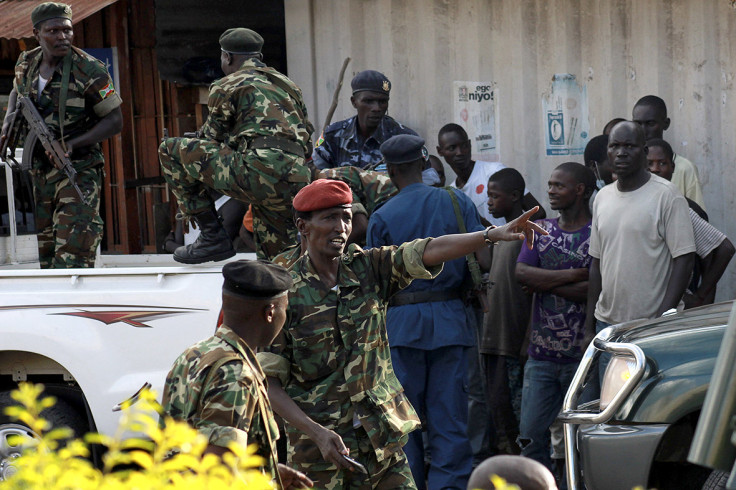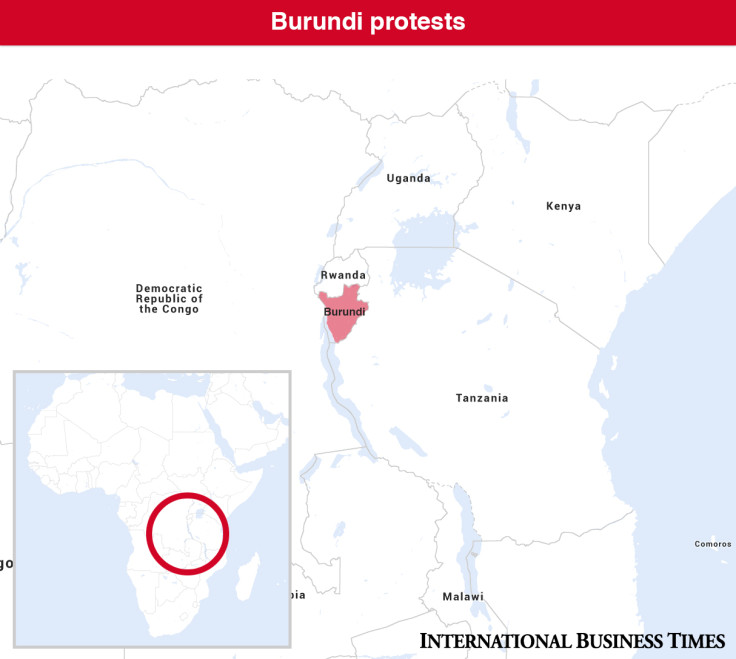Burundi descends into communication 'blackout'

A day after an attempted coup in Burundi failed, the country has descended into a communications "blackout", as all but one media have been shut down and opposition leaders say they are fearing a post-coup repression.
Following weeks of protest, the Burundian army announced a coup on 13 May. After hours of pitched battle between forces loyal to incumbent President Pierre Nkurunziza and the supporters of the coup, the insurgents surrendered.
Except the state-run radio RTNB, "completely devolved to the President", all other media outlets have closed down by force or have intentionally been shut down.
Burundi's respected Iwacu news website stopped publishing stories for "security reasons" on Thursday (14 May).
"I had to stop our newspaper and website," Antoine Kaburahe, director of the independent and main news website in the country, told IBTimes UK from Bujumbura.
Pour des raisons de sécurité le Groupe de Presse Iwacu a arrêté provisoirement de travailler.
Antoine Kaburahe #Burundi #Bujumbura @abakunzi
— Iwacu (@abakunzi) May 14, 2015"After the loyalist (government) forces had already shut down four independent media, our press group remained. I received information that we were the next ones on the list. So we decided to act and closed our offices."
He added: "When independent radios are burned down, when people loot them, this shows the extent of their determination. What has happened to the media here is catastrophic. Burundi is now in a total blackout. Media pluralism is no more. It is over."
While the editor explains Burundi was one of the countries in Central Africa with the most press freedom, he slammed the "complete, terrible regression" that followed.
"In the absence of a flourishing economy, we at least had an extraordinary press freedom that we can't really find elsewhere in Africa. Now, we are holed up in our homes," the director said, explaining that he has not left his house for two days for fear his life could be at risk.
After the Burundi Journalists' Union brought the case to court, the East African Court of Justice on Friday condemned Burundi's press restrictions, which it said violate the right to press freedom and the right to freedom of expression.

"Coming after days of violence and uncertainty in the country, this judgment now requires the government of Burundi to cease violating the rights of journalists," the court said in a statement. "Over the past weeks, radio stations as well as the Press House in Bujumbura, where the Burundi Journalists' Union has its offices, have been forcibly closed."
The president of the Burundi Journalists' Union, Alexandre Niyungeko, has also been receiving regular death threats and has been forced into hiding.
Kaburahe questioned how elections could take place in a country without media pluralism.
Army: 'A question of life and death'
Fear has also spread within the army, where divisions remain.
While parts of the army pledged loyalty to the Nkurunziza, various battalions including the "beret rouges" (red berets) of the Burundian Parachute Battalion, Burundi's 11th Tank Battalion known as the "bérets noirs" (the black berets) and the ISCAM, the Reserve Officers School, supported the President's ousting.
President spokesman Willy Nyamitwe told IBTimes UK on May 13 that Nkurunziza's "first priority was to take care of that [the coup]" as he revealed the coup leader, Gen Niyombareh who is still at large, was actively been tracked down by the president's security forces.
A colonel within Burundi's army told IBTimes UK of "total confusion" within the army barracks, and that these divisions mean "no one controls anyone".
The serviceman, who chose to speak under anonymity, also explained how soldiers, who continue to back the aborted coup d'etat, had "shut their phones off" as they believe phones are being tapped.
"It's not a fear, it's a certainty," he said from Burundi.
"It's a question of life and death. Everyone is observing everyone else. The question now is whether some military officers are going to fight others?"
Kaburahe confirmed fear was growing in the country's capital, Bujumbura.
"Fear has set in people's minds. This is a system that is very brutal, which functions with the reflexes of the maquis," he said The reference is to the rural guerrilla bands of French Resistance fighters called maquisards during the World War II, who used violence and other tactics to harass the Milice and German occupation troops.
Asked why he could not speak over the phone on Friday morning (15 May), Pierre-Claver Mbonimpa, the leader of Burundi's civil society and opposition figure, told IBTimes UK he "could not speak".
"I am afraid of saying anything now. There are reasons why I cannot speak," he said, referring to the same allegations that phones are tapped.
UPDATE:
(2:30pm GNT 15 May)
The president's spokesman told IBTimes UK three prisoners of the failed coup in Burundi who were arrested on Friday morning by government loyalists are held in a safe place.
"They are going to face trial, they will be sent to court, they won't be killed – they are not facing execution, this is a narrative illustrated on social media," presidential communications chief Willy Nyamitwe told IBTimes UK.
"They are in a safe place."
Burundi
Capital: Bujumbura.
Population: 10.6 million of whom 85% are Hutu, 14% Tutsi, and 1% Twa.
Official languages: Kirundi, French, English.
Colonisation era: Burundi and Rwanda were German colonies from the 19<sup>th century until the end of the Second World War. Then Belgium took control of the so-called "Rwanda-Urundi", modern day Rwanda and Burundi.
Burundi gained independence and established a constitutional monarchy in 1962. It became a republic in 1966.
Civil war: The first democratically elected Hutu president, Melchior Ndadaye, was assassinated by Tutsi extremists three months after taking office in 1993. Hutus started massacring Tutsis and in retaliation, the army, mainly composed of Tutsis, killed thousands of Hutus.
This sparked civil war which claimed at least 300,000 lives.
© Copyright IBTimes 2025. All rights reserved.






















